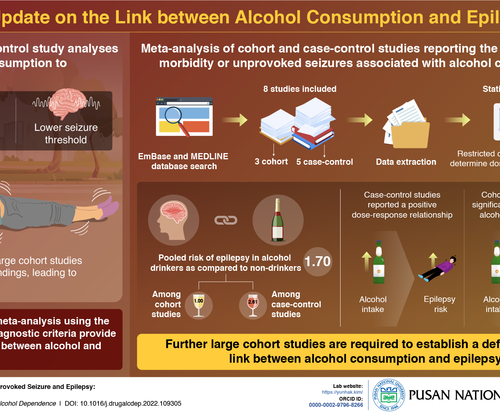Reviewed by Lily Ramsey, LLM Jun 12 2023 A new study led by investigators from Massachusetts General Hospital, a founding member of the Mass General Brigham healthcare system, offers an explanation for why light-to-moderate alcohol consumption may be associated with lower risk of heart disease. For the first time, researchers found that alcohol, in light...
Tag: <span>alcohol consumption</span>
The link between alcohol consumption and epilepsy: An update from scientists from Pusan National University
PUSAN NATIONAL UNIVERSITY IMAGE: SCIENTISTS CONDUCT AN UPDATED ANALYSIS TO CLARIFY IF ALCOHOL DRINKERS MAY BE AT HIGHER RISK OF DEVELOPING EPILEPSY AND UNPROVOKED SEIZURES CREDIT: PUSAN NATIONAL UNIVERSITY Epilepsy, a common neurological disorder associated with stigma, psychiatric comorbidities, and rising healthcare costs, affects approximately 50 million people globally. A common risk factor associated with...
Alcohol consumption is affected by a protein linked to the circadian rhythm, new research finds
by Patrick Lejtenyi, Concordia University Credit: Pixabay/CC0 Public Domain It’s a commonly heard question after New Year’s [celebrations]: “Why do we drink the way we do?” A group of researchers has found that at least some of it has to do with a particular protein in the part of the forebrain that regulates, among other...
Moderate alcohol consumption ‘should not be recommended for health reasons’
Does moderate alcohol use reduce mortality risk? Rafa Elias/Getty Images A new study contradicts previous findings that link moderate alcohol consumption to health benefits and a longer life. The researchers found that those who abstain from alcohol may have a higher mortality rate because of risky behaviors in which they engaged earlier in life. The...
Physical pain is a key factor in alcohol consumption relapse after a period of abstinence
by Asociacion RUVID Credit: CC0 Public Domain The study has also shown changes in an area of the brain related to motivation for drug intake, and in a second experiment, they have shown that the kappa-type opioid receptor (a protein) is key to causing these animals to relapse. Research by the Department of Pharmacy and Pharmaceutical...




